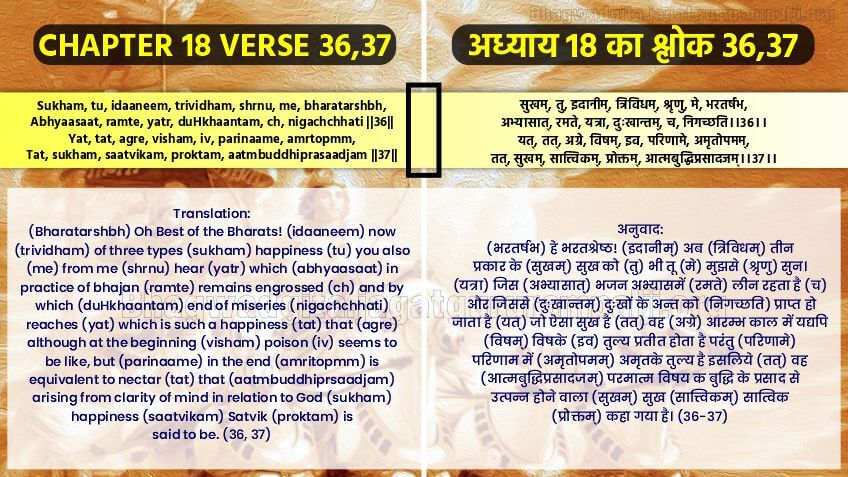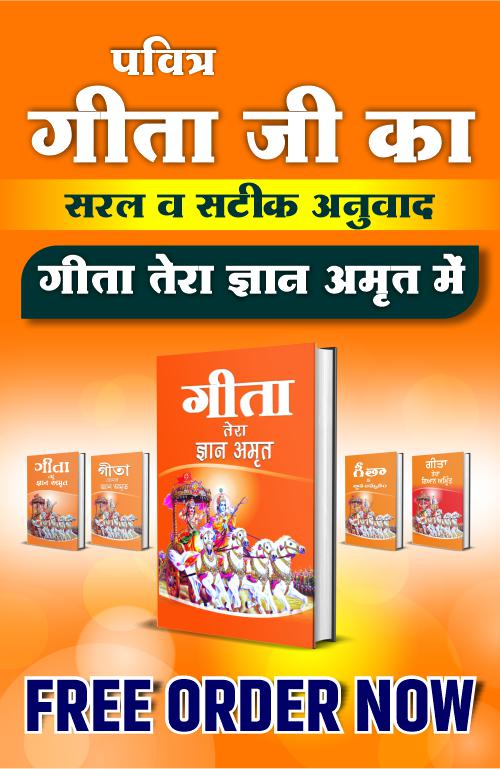
Sukham, tu, idaaneem, trividham, shrnu, me, bharatarshbh,
Abhyaasaat, ramte, yatr, duHkhaantam, ch, nigachchhati ||36||
Yat, tat, agre, visham, iv, parinaame, amrtopmm,
Tat, sukham, saatvikam, proktam, aatmbuddhiprasaadjam ||37||
Translation: (Bharatarshbh) Oh Best of the Bharats! (idaaneem) now (trividham) of three types (sukham) happiness (tu) you also (me) from me (shrnu) hear (yatr) which (abhyaasaat) in practice of bhajan (ramte) remains engrossed (ch) and by which (duHkhaantam) end of miseries (nigachchhati) reaches (yat) which is such a happiness (tat) that (agre) although at the beginning (visham) poison (iv) seems to be like, but (parinaame) in the end (amritopmm) is equivalent to nectar (tat) that (aatmbuddhiprsaadjam) arising from clarity of mind in relation to God (sukham) happiness (saatvikam) Satvik (proktam) is said to be. (36, 37)
Translation
Oh Best of the Bharats! Now you also hear the three types of happiness from me. The bhajan in the practice of which one remains engrossed, and by which one reaches the end of miseries, which is such a happiness that although it seems like poison at the beginning, but in the end is equivalent to nectar, that happiness, arising from the clarity of mind in relation to God is said to be Satvik.
सुखम्, तु, इदानीम्, त्रिविधम्, श्रृणु, मे, भरतर्षभ,
अभ्यासात्, रमते, यत्रा, दुःखान्तम्, च, निगच्छति।।36।।
यत्, तत्, अग्रे, विषम्, इव, परिणामे, अमृतोपमम्,
तत्, सुखम्, सात्त्विकम्, प्रोक्तम्, आत्मबुद्धिप्रसादजम्।।37।।
अनुवाद: (भरतर्षभ) हे भरतश्रेष्ठ! (इदानीम्) अब (त्रिविधम्) तीन प्रकारके (सुखम्) सुखको (तु) भी तू (मे) मुझसे (श्रृृणु) सुन। (यत्रा) जिस (अभ्यासात्) भजन अभ्यासमें (रमते) लीन रहता है (च) और जिससे (दुःखान्तम्) दुःखोंके अन्तको (निगच्छति) प्राप्त हो जाता है (यत्) जो ऐसा सुख है (तत्) वह (अग्रे) आरम्भकालमें यद्यपि (विषम्) विषके (इव) तुल्य प्रतीत होता है परंतु (परिणामे) परिणाममें (अमृृतोपमम्) अमृृतके तुल्य है इसलिये (तत्) वह (आत्मबुद्धिप्रसादजम्) परमात्मविषयक बुद्धिके प्रसादसे उत्पन्न होनेवाला (सुखम्) सुख (सात्त्विकम्) सात्विक (प्रोक्तम्) कहा गया है। (36-37)
